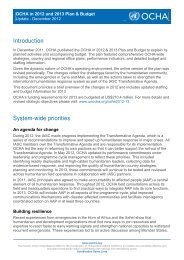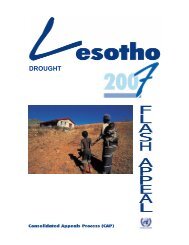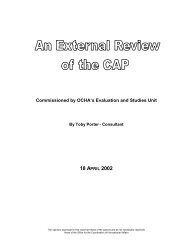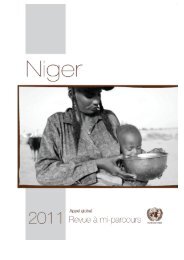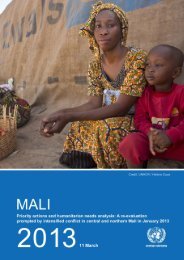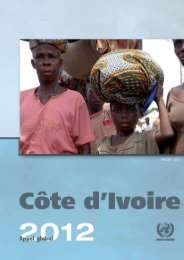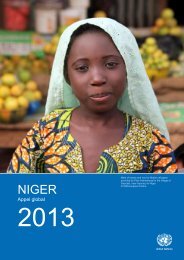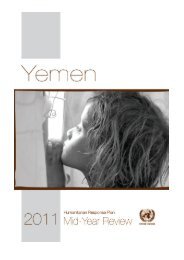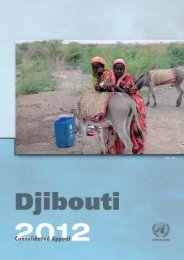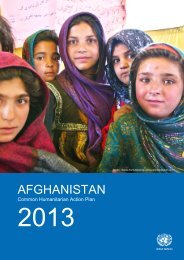16[1] 2011 in review | changes in the context United Nations and PartnersSudan work plan 2012remain outside the process . Indeed, a couple <strong>of</strong> the largestarmed opposition groups – the Sudan Liberation Movement/Army and the Justice and Equality Movement (JEM) – formedthe Sudan Revolutionary Front (SRF) alliance with armedopposition movements in South Kord<strong>of</strong>an and Blue Nile . SRFforces have clashed with the SAF both in Darfur and alongthe border areas during the first half <strong>of</strong> the year . The firsthalf year also witnessed tribal clashes that caused populationdisplacement in some parts <strong>of</strong> North Darfur.Fighting and DisplacementAccording to the Government, a Sudan Liberation Army– MinniMinawi (SLA-MM) and JEM attack on military andpolice barracks in the Um Dafog area in South Darfur (nearthe Central African Republic border) resulted in the death <strong>of</strong>48 individuals (civilians and military), while nearly 500 individualshad their homes burnt down. Fighting between theSPLA and Government forces in South Darfur resulted in thedisplace¬ment <strong>of</strong> 5,029 people. In East Darfur state, fightingbetween SPLA and Government forces resulted into displacement<strong>of</strong> 15,000 individuals. Furthermore, approximately 3,000people were displaced in March due to fighting between theSAF and the Sudan Liberation Army – Abdel Wahid (SLA-AW)in western Jebel Marra in Central Darfur state. No assessmentor response has been completed in the affected areasdue to access restrictions imposed on humanitarian agenciesby the Government.There was also new displacement in Darfur as a result <strong>of</strong>armed inter-tribal conflict . Approximately 2,400 people (90%women and girls) were displaced from the Dar es Salaam areain North Darfur to Zamzam IDP camp in February followingclashes between the Zaghawa and Birgid tribal groups overaccess to land and natural resources.Returns continue but returnees face significantchallengesRefugees and IDPs continued to return to areas <strong>of</strong> originin Darfur during the first quarter <strong>of</strong> 2012. The Return andRein¬tegration Working Groups (RRWG) confirmed thevoluntary return <strong>of</strong> 37,444 IDPs and 1,145 Refugees: 29,564IDPs and 1,145 Refuges in West Darfur and 7,790 IDPs inNorth Darfur . No returns in South Darfur were recorded .The RRWGs also released cumulative figures for 2011 thatindicated that 140,000 displaced people returned in 2011(109,000 IDPs and 31,000 refugees from Chad) . This makes atotal <strong>of</strong> 178,000 returnees between January 2011 and March2012 . Most <strong>of</strong> these returns have been observed as spontaneous. Current returnees cited the improved security environmentand access to farm land as the primary reasons fortheir return.Returnees have faced significant challenges including a lack<strong>of</strong> functioning and sustainable basic services, livelihoodsopportunities, food insecurity, as well as issues relating toland tenure . Inter-agency assessments indicated that thelack <strong>of</strong> security, such as a police presence, was also a concernto many returnees . These challenges are in the context <strong>of</strong> thehistorically low level <strong>of</strong> government investment or support inthese areas and threaten the overall sustainability <strong>of</strong> returns.Overall, however, Darfur is still characterized by large-scaledisplacement; the most recent WFP figures indicate that anestimated 1.7 million people are registered for food distributionin IDP camps or camp-settings throughout Darfur.Humanitarian Access and SecurityHumanitarian organizations are able to access the majority <strong>of</strong>people in need in Darfur. However, they <strong>of</strong>ten face constraintsincluding insecurity, access restrictions, bureaucratic impediments,poor infrastructure, and self-imposed UN secu¬rityprocedures . Generally, INGOs face more restrictions thanother humanitarian organizations . However, the INGOs thatpursue a more flexible security management accessed somelocations by deploying national staff, implementing projectsthrough national non-governmental organisations (NNGOs)and use <strong>of</strong> locally rented vehicles.Insecurity continues to be the major impediment to access,typically in the form <strong>of</strong> clashes between the SAF, militias andarmed opposition movements as well as inter-tribal conflict,criminality, and banditry . Areas under the control <strong>of</strong> armedopposition movements, particularly the eastern and westernJebel Marra, have been largely inaccessible because <strong>of</strong> suchrestrictions during 2012 . In South Darfur, there have beena number <strong>of</strong> restrictions on travel by road outside Nyala,due to insecurity caused by frequent movements <strong>of</strong> armedgroups, banditry, and instances <strong>of</strong> carjacking, which hasaffected access to IDP camps and other populations in need. The shortage <strong>of</strong> fuel supplies within the region has furtheraffected the movement <strong>of</strong> humanitarian cargo, personnel,and operations. To mitigate the situation, United Nations-African Union Mission in Darfur (UNAMID) has supportedAID FLOWPeacekeepingAid flows to SudanAnnual flows, excluding peacekeeping (in $ billion)● Development ● Humanitarian1996199719981999200020012002200320042005200620072008200920103.02.52.01.51.00.50.0CERF allocations to Sudan (2006-2012, $m)Central Emergency Response Fund in Sudan35.52006Sudan25.5200716.02008South Sudan25.8200923.9201022.818.320115.22012UNMIS, UNAMID and UNISFA deploymentNumber <strong>of</strong> military, police, civilian staff (in ‘000)● UNMIS ● UNAMID ● UNISFADec-05Jun-06Dec-06Jun-07Dec-07Jun-089 July 2011(UNMIS mandate expiry)Dec-08Jun-09Dec-09Jun-10Dec-10Jun-11Dec-11Jun-122520151050Source: OCHA, Financial Tracking System (2012), fts.un.org; OECD DAC (2012), CRS aid flow database for 1996-2010 (2012)Source: UNMIS, UNAMID, UNISFA (2012)
United Nations and Partners[1] 2011 in review | changes in the contextSudan work plan 201217transportation <strong>of</strong> humanitarian supplies using either armedescorts or air flights. Such movements have been contingentupon humanitarian organizations being able to secure thenecessary security clearance from the authorities.Moreover, the Government announced that new proceduresare now required for humanitarian personnel to travel toDarfur. A number <strong>of</strong> staff from UN agencies and NGOs wereprevented from travelling to Darfur on UNHAS flights in Mayand June. They were informed by airport security <strong>of</strong>ficialsthat there were unable to travel because they did not havethe correct permits. In addition, the Govern¬ment cancelledUNHAS flights in Darfur for a one week period citing insecurity,affecting access to deep-field locations.There have been frequent cases <strong>of</strong> security incidentsinvolv¬ing humanitarian personnel including several cases<strong>of</strong> carjacking in 2012. In the most serious case, an internationalUN staff member was abducted at gunpoint in Nyala,South Darfur and kept in captivity for 86 days before beingreleased. The Darfur state governments <strong>of</strong>fered an increasedsecurity presence in order to mitigate such threats . Meanwhile,one UNAMID peacekeeper was killed and severalinjured as a result <strong>of</strong> several security incidents during the firsthalf <strong>of</strong> the year. Criminal activities have targeted assets <strong>of</strong>both interna¬tional organizations and governmental authorities(including security organs).Eastern SudanThe political and security situation in Eastern Sudan remainedrelatively peaceful during 2012 . Approximately 2,000 refugeeshave arrived per month on average during the first half <strong>of</strong> theyear from neighboring countries, primarily Eritrea. While mostrefugees are young men, there are an increasing number <strong>of</strong>women and families among the new arrivals.Following project impact assessement by HAC, on 31 May,seven INGOs received letters from the Govern¬ment’s HumanitarianAid Commission (HAC) ordering them to cease directimplementation <strong>of</strong> eight projects (out <strong>of</strong> 17) and to close theirrespective projects in eastern Sudan by the end <strong>of</strong> June 2012and hand them over to national NGOs and institutions. Theseven INGOs reported that they were running programmesserving more than 600,000 people across a range <strong>of</strong> sectors,<strong>of</strong>ten in collaboration with, or in support <strong>of</strong>, Government lineminis¬tries. The closure <strong>of</strong> these projects followed an assessmentundertaken by HAC, in which HAC determined that therewere problems relating to the management <strong>of</strong> the projects,and that they were no longer “feasible”. In certain sectors theGovernment line ministries or national organizations needsome support to fully take over these activities.




